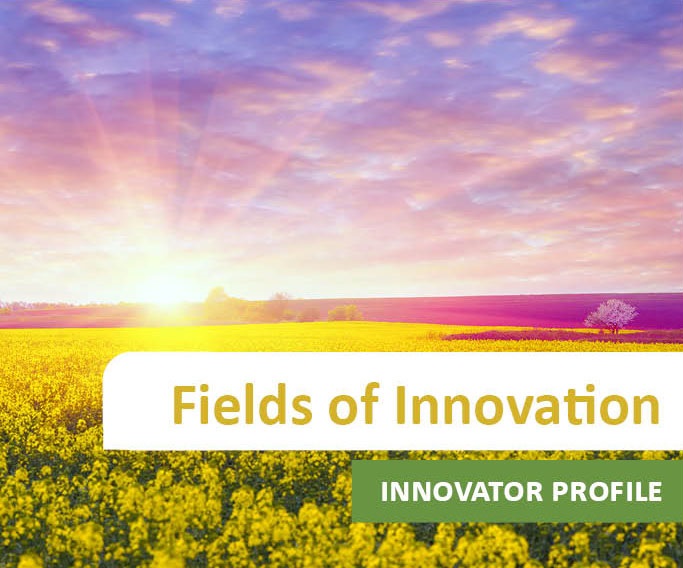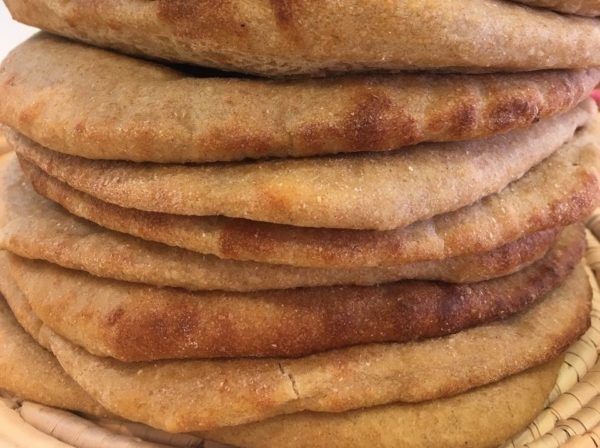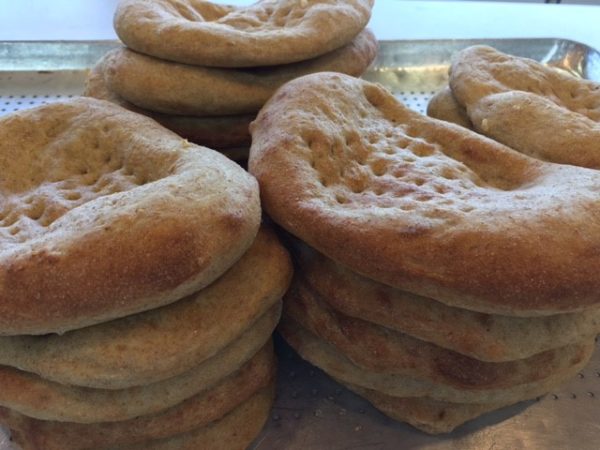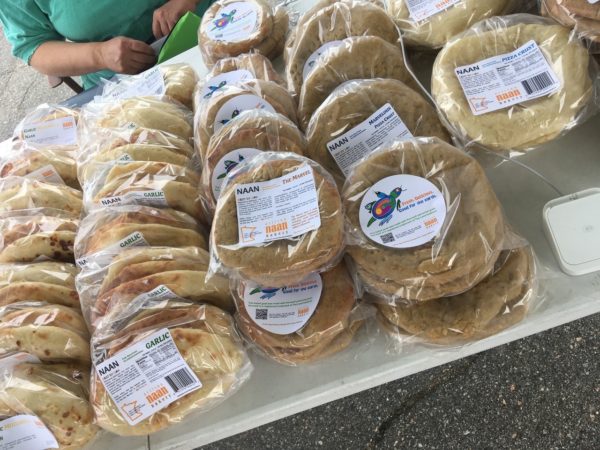AURI Connects: Fields of Innovation Innovator Profiles is a Q&A series with Minnesota entrepreneurs who have partnered with AURI to build capacity and successfully commercialize new crop and livestock opportunities, including new traits for existing crops.
Q&A with Gwen Williams, owner of Artisan Naan Bakery
AURI: What is your involvement with the Agricultural Utilization Research Institute (AURI)?
GW: AURI introduced Artisan Naan Bakery to Kernza® perennial grain and therefore, introduced the bakery to the vast world of ongoing perennial crop research. In the fall of 2020, AURI contacted our bakery to inquire if we would be interested in doing a baking pilot project with an emerging grain, Kernza®. After a bit of reading about this grain on our part, we replied that we absolutely would be interested in baking with Kernza® in a pilot project.
The perennial nature of Kernza® was very compelling, and we believed that our existing customers would find the story of Kernza® compelling as well—especially given all the Kernza® growing and research activities being conducted in our home county, Stearns County. While 95% of our bakery business is wholesale to Twin Cities metro grocers and food cooperatives, we have had ample experiences selling directly to end-consumers through our St Cloud bakery storefront and at various Stearns County farmers markets.
So, we worked with AURI on a Kernza® Naan pilot project, where essentially, we sold our freshly baked Kernza® naan directly to retail and St Cloud farmers market customers from May 2021 through August 2021. As part of the pilot project, the bakery provided written and verbal feedback to AURI about working with Kernza® flour and selling our Kernza® Naan; and AURI fielded our many questions about Kernza® and small grain processing from “field to flour sacks.” AURI created an online survey for buyers of our Kernza® Naan to gather information on attitudes and interest in Kernza® products among general consumers; and shared a QR code linking to the survey, which the bakery affixed to a label on each Kernza® product we sold at the farmers market and at our storefront. Overall, the pilot project was a great success. And the bakery knows more about our principal and definitive ingredient, flour, as a result.
To view a full timeline of this collaboration, click here.
AURI: What innovative ag pathway(s) are you blazing? Why was this an important path for you to take?
GW: We believe the ultimate commercial success of the intermediate wheatgrass grain, Kernza®, is intertwined with its acceptance as a grain used for baking bread. Unlike the most mouth-watering and flavorful baked goods (cookies, cakes, pies, pastries), bread is a basic food staple frequently at the center of our daily meals.
Baking bread with Kernza® has enabled our bakery to expand and diversify its fresh bread products. Our Kernza® Naan is our first whole-grain naan to find committed, repeat customers. It is also our 3rd non-dairy (vegan) naan we bake, enabling us to offer more choices to our existing non-dairy (vegan) customer base.
In June 2021, after one month of directly selling a Kernza® naan at the local farmers market and at our storefront as a pilot project with AURI, the bakery started planning to sell our Kernza® Naan to our existing wholesale customers in the Twin Cities metro. By August 2021, we had delivered our first batches of freshly baked Kernza® Naan to 4 food cooperatives in Minneapolis. Then in November 2021, we started making our bakery’s other kind of flatbread, pita pockets, with Kernza® perennial grain flour. Our Kernza® Pitas are sold at 8 selected Lunds & Byerlys stores.
We were the first Minnesota bread bakery to place any Kernza® bread on grocery store shelves – and we are pleased to say that 4 days every week, we deliver fresh Kernza® bread to our wholesale customers in the Twin Cities metro. We have firm plans to place Kernza® bread at more stores by early spring 2022.
We started baking bread with Kernza® for a pilot project with AURI, and thereafter, for our existing wholesale customers, for three simple reasons. One, researchers had found that Kernza® was perhaps optimal for baking products such as flatbreads, and flatbreads are precisely what we bake. Two, we were both intrigued and encouraged by the involvement of General Mills in Kernza®’s research and commercialization efforts. Meaning, we had concluded that if General Mills was serious about Kernza®, then the feasibility of Kernza®’s success as a new grain crop was likely to be exceedingly high. I suppose you could say that early on we had confidence in the seriousness of the investments in standing up this new grain crop. Three, as a small batch artisanal bread bakery, we have an ideal setup for working with small experimental batches of dough, meaning, we did not have to alter our working processes to experiment with this new flour. So, it was a seamless fit with our everyday work. In short, it seemed good business sense for us to bake with Kernza® flour on a regular basis.
AURI: What are the challenges presented and opportunities offered?
GW: The challenges the bakery faces with baking and selling our Kernza® breads are the same challenges we have always faced as a bakery. That is, our challenges have never really been selling our bread to customers that would like to buy it. Demand for our fresh bread far outpaces our ability to make it. Rather, our challenges have always been production and distribution.
Perhaps our challenges are ones that many local, from-scratch bakeries face. Ironically, we believe our success as a bakery and demand for our breads are because we are small and agile and bake and sell fresh bread that we have processed by hand. In the case of our naan, we hand-toss it as millions of bakers in Asia and the Mediterranean do so, and our pitas are produced using small tabletop bakery equipment. . In other words, we are skilled specialty bakers, skilled at making a minor bread in North America.
Where we differ from many local, from-scratch bakeries in North America is we have an additional challenge in finding skilled bakers of our breads, or in finding interested apprentices who would like to learn the skills of making what amounts to be a minor bread in our country.
Many breads are sold in grocery stores at a dime a dozen, so to speak, having been produced in highly automated factories and distributed as frozen products to retailers. While there will always be customers (probably too numerous to count) for bread produced in this common manner, our business has demonstrated that there is also high demand among customers for local artisanal breads made on a much smaller scale. We print on our labels, “Fresh. Never frozen. No artificial preservatives.” And we believe a substantial number of our devoted customers are buying our breads precisely because the breads have the unmistakable aroma and taste of having been freshly baked. So, our commitment to selling and distributing fresh bread, as opposed to selling a frozen product, presents challenges in working with a third-party distributor. Even if a distributor can turn and deliver in, for example, two days, that would be cutting 2 days from our shelf life for the customer. And so, we deliver our bread in our own bakery vehicle.
Perhaps an opportunity to scale our business is to scale in a modular or franchise manner, thereby creating a small network of decentralized fresh flatbread bakeries. Or, to work out a new distribution arrangement with a local distributor who is interested in and willing to work with the short shelf life of freshly baked breads so that they could be delivered the very next day; It seems we could find such a distributor, but. then again, we are crazy for fresh bread!
There are many other flatbreads beyond naan and pita that are popular throughout Asia, the Mediterranean region, and Scandinavian countries. And we have experimented with making a few using Kernza® and other flours. Expanding our flatbread menu using tabletop bakery equipment is a good opportunity for the bakery to make use of our expertise with flatbread baking, make use of small-scale automated processes, and maintain coherence as a baking business.
AURI: Do you or have you collaborated with other small businesses? If so, in what way?
GW: The bakery has started our 8th year of business, throughout which we have worked with other small businesses as a buyer and producer.
From the start, we have purchased whole milk from Stony Creek Dairy in Melrose, MN and extra virgin sunflower oil from Smude Sunflower Oil in Pierz, MN. Every naan and pita pocket we make has at least one of those liquids in it. And every dairy naan we make has our in-house yogurt, first started with a certified organic yogurt, and always made with Stony Creek Dairy whole milk.
Our first wholesale customer, the White Horse Restaurant and Bar, in December 2014, explained what qualities they would like in a naan to serve on their menu, and we developed a recipe specifically for the texture, softness, and relative uniform flatness they desired. We still make this naan for this local St Cloud business. The White Horse naan is our all-time 3rd best-selling naan, after our two standards, the Garlic, and the Plain. Together our top 3 naans account for 70—75% of our annual sales.
And now that we are baking with the new Kernza® flour, we are buying from other small businesses, from grower through to the miller.
AURI: Where can AURI readers and supporters purchase your products, connect with your business online, and/or help your business thrive?
GW: For a complete and up-to-date listing of our products and customers, go to our website: www.artisannaan.com
The bakery primarily wholesales to grocers and food cooperatives in Minnesota. We also sell directly at our storefront in St Cloud. . Order online through our website for pickup at the bakery, or shipping via US Postal Service.
As of January 2022, our Twin Cities metro wholesale customers include, Lunds & Byerlys stores, the Wedge Community Co-Op, Eastside Food Co-op, Linden Hills Food Co-Op, the Seward Community Co-Ops, and Lakewinds Food Co-Ops. In central Minnesota, the Good Earth Food Co-Op in St Cloud, Minnesota Street Market in St Joe, and City Center in Princeton.
Follow us on Instagram and Facebook.
Want to become an apprentice baker and work with Kernza® perennial grain flour? Please message us through one of our social media platforms.
 Funding for this project was provided by the Minnesota Environment and Natural Resources Trust Fund as recommended by the Legislative-Citizen Commission on Minnesota Resources (LCCMR).
Funding for this project was provided by the Minnesota Environment and Natural Resources Trust Fund as recommended by the Legislative-Citizen Commission on Minnesota Resources (LCCMR).




